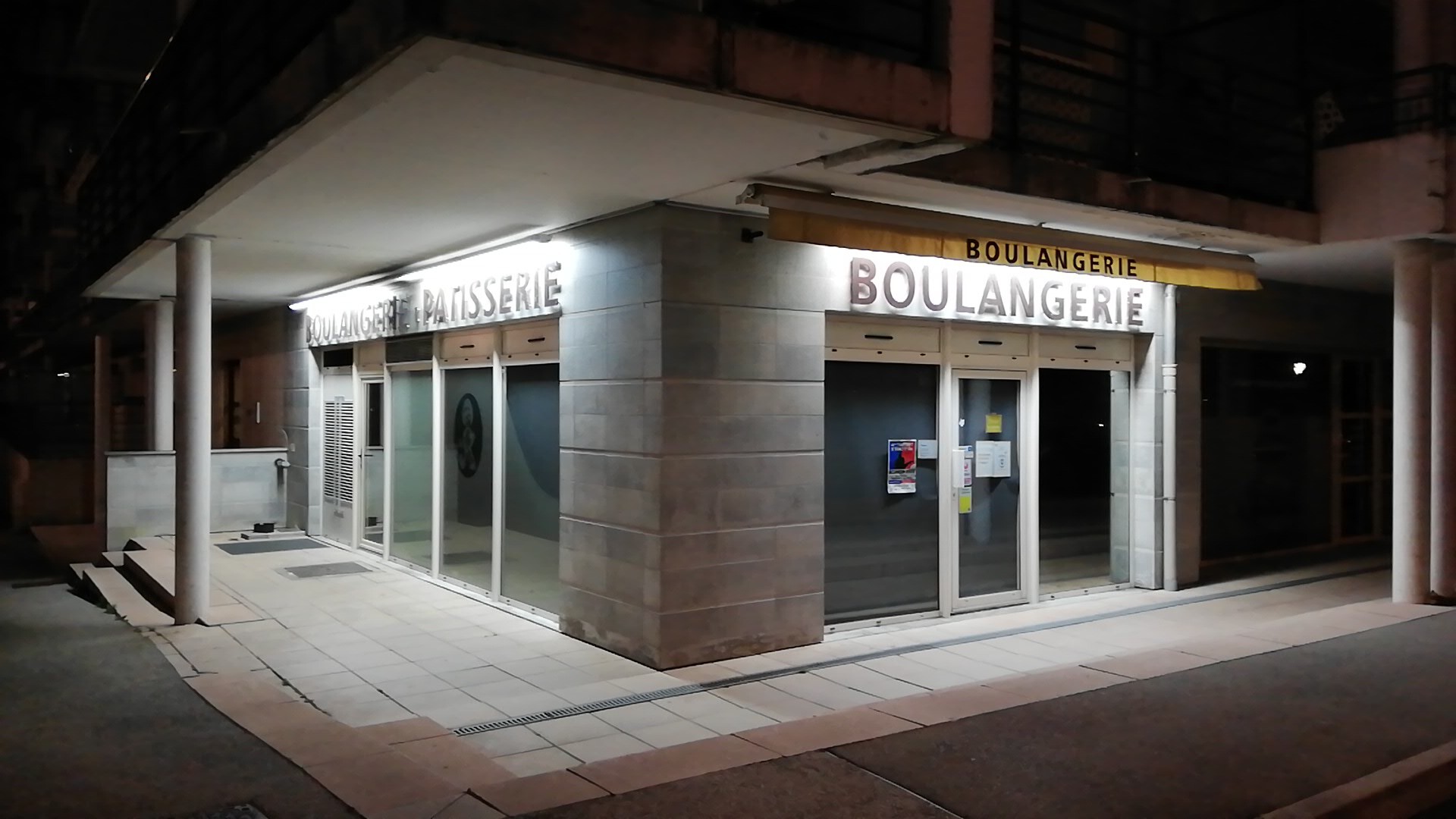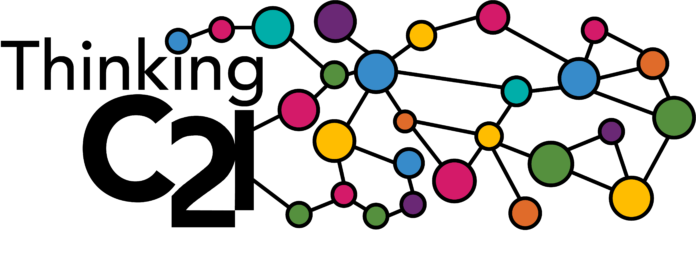Fátima Fernandes da Silva
Besançon, France
Boulangerie, 2022
Huawei P20 lite digital photograph
On February the 20th 2022, by the end of the afternoon, I went out for a walk. I stopped at the corner of my old apartment and the bakery where I used to buy baguettes caught my eye. Empty, just like the streets, still cold. Boulangerie, such a symbol of comfort and happiness when France was still a holyday destination.

Fátima Fernandes da Silva
Besançon, France
Crossed Wires / Linhas cruzadas, 2022
Auto-fiction
Walking the streets of Besançon I received a phone call from a mobile phone company. The lady wanted to explain to me all the advantages of switching to her brand, and while listening to her I could only think I had no one to talk to.
Crossed Wires
She lives in a narrow street, perpendicular to the tram avenue. The building has a ground floor and three floors on top of it, in which there are five apartments. Lots of people probably live there, there are so many names in the mail boxes! From the terrace, close to the main door, she watches people going in and out. Some of them are familiar, she even salutes two or three. The old man that lives in the apartment in front of hers is kind, he smiles, he says bonjour. Once, when she inadvertently had left her cat outside, he heard the miaows and went to the landing. His wife sometimes smiles, when they meet, she does not talk. The next-door neighbour, in his forties, probably divorced, always tries to avoid her, and when that is not possible, he does nothing more than a light nod. There is also the lady who, during lunch time, walks her cats on a leash: one at the time, since they always want to take different directions. During summer time, families enter, with big bags full of food and drinks, attending lunches at the balconies. The man next-door frequently organizes dinners in his terrace. The tobacco smoke, the barbecue smell and the laughter ― that grows louder and louder, until abruptly falling ― cross the transparent partition that separates his terrace from hers. Almost every day, she goes to the closest grocery. There she sees people, she listens to them speaking. They say bonjour when she enters. They say that to all their clients, a lot of them don’t even notice, but they keep saying it to the next ones. On the way out, at the cash desk, people speak: she says her name, she says how she is going to pay, she shows her empty bag, she says goodbye. When the weather is very cold or very hot, it is possible to speak for some more seconds. When she forgets her bag, they let her know that there are boxes outside. She used to go to the fishmonger inside the market, but the owner’s abusive conversation made her search for some options. She started going to the one across the square. They are very nice, sometimes they talk about the sun and the sea of their grandparent’s Italy. In the market she enjoys watching people, she does not mind waiting in the queue: she listens to the name of the vegetables, to the numbers of their bills. She used to go to an Irish pub, but then it was closed for a long time, she stopped going. When she goes out for a walk, she always turns to the city centre, down to the bridge where the river enlarges, turning into the waves of her sea. In the park, she sits in front of the water falling in a hypnotic continuum. The museum clock strikes the hours, time goes by. Willingness to get home. In the computer or in the mobile phone, she listens to people speaking on a series. Familiar sounds, laughter and expressions and benign discussions. And images of sun, of sand, of sea. She breathes without filling the chest. The telephone rings, an enterprise that wants to sell a different internet and mobile plan. She says she is not interested, she thanks, while on the other side the unflappable voice keeps selling what she does not want to buy. This could be a method for talking to people, asking for services plans. For information. Making calls to ask for the opening hours of stores. Ask for the timetable of trains. Of buses. Of cars. Of scooters. Of everything that circulates arriving nowhere. She misses crossed lines, when you could hear a conversation on the telephone. We used to hang up. Today I would remain listening, silently, as if I was being talked to.
Linhas cruzadas
Vive numa rua estreita, perpendicular à avenida por onde passam os eléctricos. O prédio tem o rés-do-chão e três andares para cima, com cinco apartamentos por piso. Decerto moram lá muitas pessoas, há tantos nomes nas caixas do correio! Da varanda, junto à porta principal, vê as pessoas que entram e saem. Algumas já conhece, até cumprimenta duas ou três. O senhor idoso do apartamento em frente é simpático, sorri, diz bonjour. Uma vez, em que por engano a gata tinha ficado do lado de fora, foi ao patamar atraído pelos miados. A mulher dele sorri por vezes, quando se encontram, não fala. O vizinho do lado, de uns quarenta e tal anos, provavelmente divorciado, procura sempre fugir a qualquer encontro, e quando é inevitável saúda com um leve aceno da cabeça. Também há a senhora que, durante a hora de almoço, passeia os gatos à trela: um de cada vez, visto que cada um quer ir para seu lado. Durante o Verão entram famílias, com grandes sacos cheios de comida e bebida. Vão a almoços nas varandas. O vizinho do lado dá muitos jantares no terraço. O cheiro do tabaco e da carne grelhada, e o barulho dos risos ― que vão sendo cada vez mais altos, até que caem a pique ― atravessam a divisória transparente que separa o terraço dele do dela. Quase todos os dias vai ao supermercado mais próximo. Aí vê pessoas, ouve-as falarem. Dizem-lhe bonjour à entrada. Dizem-no a todos os clientes, muitos nem reparam, mas eles continuam a dizê-lo aos seguintes. À saída, na caixa, as pessoas falam: diz o nome, como vai pagar, mostra o saco vazio, diz adeus. Quando está muito frio ou muito calor, dá para falar mais uns segundos. Quando se esquece do saco, indicam-lhe que lá fora há caixas. Costumava ir à peixaria dentro do mercado, mas foi-se fartando da conversa abusiva do dono. Começou a ir a uma que fica na praça em frente. São muito simpáticos, às vezes falam do sol e do mar da Itália dos avós. No mercado gosta de ver as pessoas, não se importa de esperar na fila: vai ouvindo os nomes dos vegetais, os números das contas. Antes ia a um bar irlandês, mas depois esteve muito tempo fechado, deixou de ir. Quando sai para caminhar, vira sempre para o centro da cidade, até à ponte onde o rio se faz maior, deixa adivinhar as ondas do mar. No parque, senta-se a ouvir a água que o desnível do rio faz cair num contínuo hipnótico. O relógio do museu vai dando as horas, o tempo que passa. Vontade de chegar a casa. No computador ou no telemóvel vai ouvindo as pessoas que falam numa série. São sons familiares, risos e ditos e discussões benignas. E imagens de sol, de areia, de mar. Respira sem encher o peito. O telefone toca, é de uma empresa que quer vender um plano de internet e telefone diferente. Diz que não está interessada, agradece, enquanto de lá a voz continua, imperturbável, a vender o que não quer comprar. Podia ser uma forma de falar com pessoas, pedir planos de serviços. Informações. Ligar para lojas a saber o horário de funcionamento. Perguntar o horário dos comboios. Dos autocarros. Dos carros. Das trotinetes. De tudo o que circula sem chegar a lado nenhum. Saudades das linhas cruzadas, em que se podia ouvir uma conversa ao telefone. Desligava-se. Hoje ficaria a ouvir, em silêncio, como se falassem comigo.

